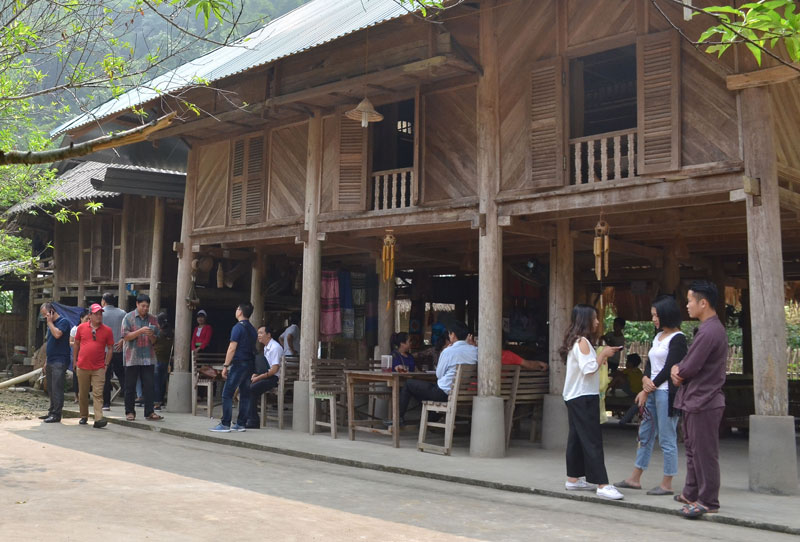
(HBO) – The Tu Ly – Hien Luong site was among the four revolutionary bases in Hoa Binh located within the Hoa – Ninh – Thanh warzone (Quang Trung warzone) during the August 1945 Revolutionary.

Community-based
tourism in Ke hamlet, Hien Luong commune (Da Bac).
Returning to Hien Luong in a typical Autumn day of August, I saw
the land, once a revolutionary base, transforming itself into a new rural style
area. The locality’s natural land spans 4,000 hectares, yet just a small
portion of this is suitable for agriculture while and the majority is forestry
land. Local authorities have worked to guide residents to capitalise on the
limited agriculture land. To date, local farmers have cultivated 11.5 ha of
summer-autumn rice and 140 ha of corn, while tending 45 ha of cassava, 20 ha of
edible canna, 1 ha of small taro, 3 ha of ginger, 3 ha of bean and peanut, and
7.5 ha of vegetables. As for animal husbandry, they have been focusing on
raising 220 buffalos, 316 cows, 635 goats, and over 16,000 fowls.
Taking advantage of Hien Luong’s lake areas, its people have
invested in aquatic farming of species, known as local specialties, in recent
years. Fish farms currently occupy 12.1 ha of water surface in the commune, of
which 8.1 ha are employed to raise fish in 389 cages. Of the total cages, 154
are self-invested, while 135 others have secured support under Decision 10 of the
provincial People’s Committee. These farms’ productivity has to date exceeded
30 tonnes, of which 6.8 tonnes are caged fish.
The local stunning lakes create a favourable condition for the
development of community tourism. A number of residents in Ke hamlet have taken
part in the business. They received support from the Australian Foundation for
the Peoples of Asia and the Pacific in terms of capital, house upgrade,
equipment purchase, and training courses. The business is new to locals but
showing potential in attracting foreign and domestic visitors who want to
discover local life and culture.
The emulation movement "Hoa Binh joining hands to build new-style rural areas” has been widely spreading, becoming a driving force that motivates the localities to renew rural landscapes and improve the material and spiritual lives of the residents. In this movement, the people play a central role-both as the main implementers and direct beneficiaries of its outcomes.
In response to the global digital revolution, Hoa Binh Newspaper is transforming itself into a modern and multi-platform media hub, blending cutting-edge technology with a restructured newsroom and a new generation of tech-savvy journalists.
Hoa Binh province’s Association of the Elderly recently held a conference to review the project on expanding the inter-generation self-help club model until 2025.
In a move to implement Resolution No. 57-NQ/TW, issued on December 22, 2024 by the Politburo, which targets breakthroughs in science-technology development, innovation, and digital transformation, the Hoa Binh provincial Department of Health has issued a plan to roll out the "Digital Literacy for All” campaign within the local health sector.
An Nghia Commune (Lạc Sơn District) is one of the communes that achieved the tha standard of the national new rural area in 2018. Entering a new development phase, the commune is now trying to meet the criteria for the advanced new rural development. With the strong political will and the public consensus, the commune is gradually overcoming the challenges to reach this goal, aiming for the sustainable development.



